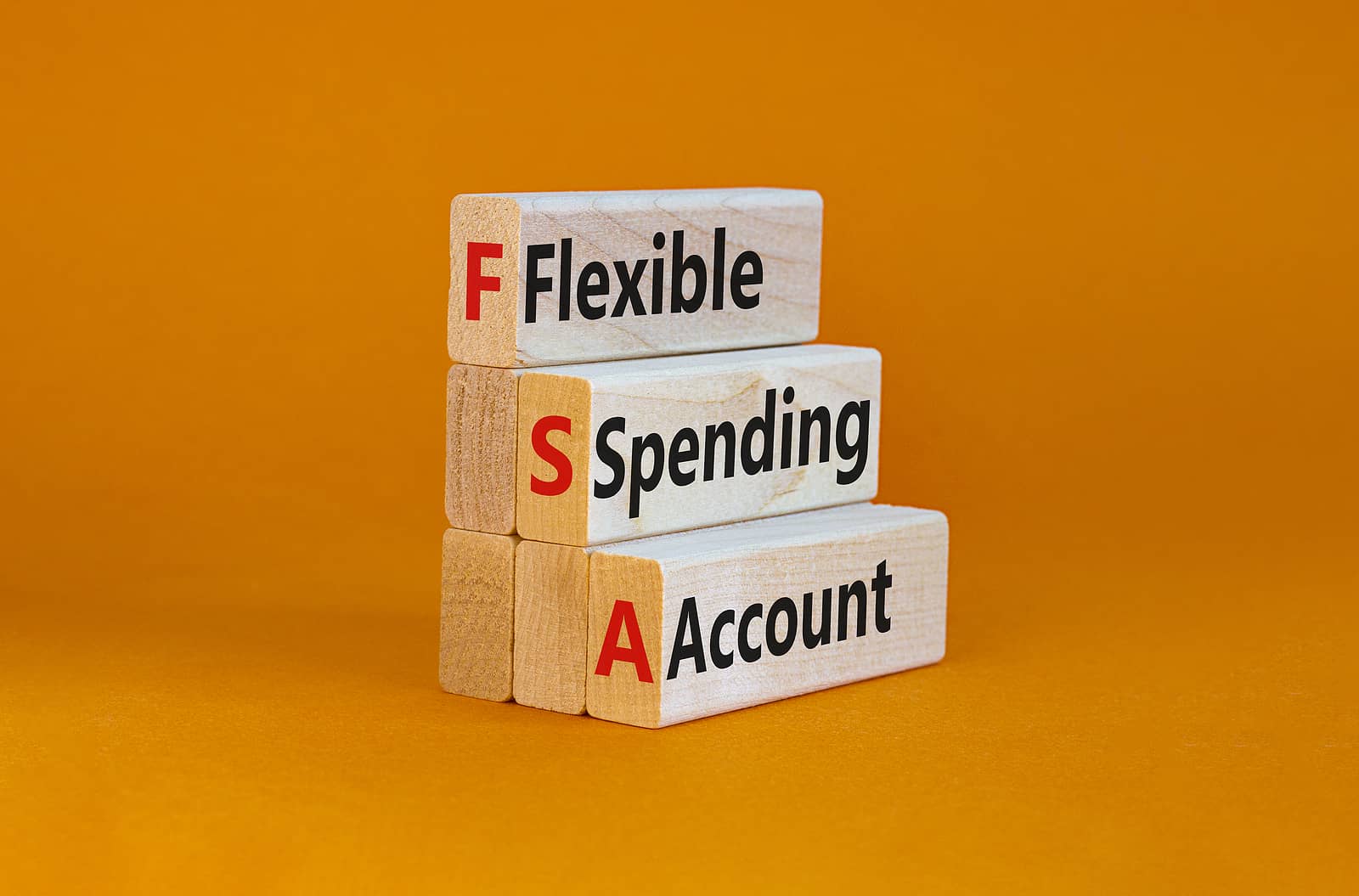UPDATED: JULY 05, 2023 | 2 MIN READ

Healthcare benefits can be confusing, but they are essential to help you take control of your physical health and finances. One common benefit employers offer is a flexible spending account (FSA). Keep reading if you want to understand a flexible savings account and how to use it.
What is an FSA, and how does it work?
A flexible spending account (also known as a flexible spending arrangement or an FSA) is an account you can use to pay out-of-pocket healthcare costs. For example, it helps cover any co-pays your insurance doesn’t cover.
How does an FSA work?
When you have an FSA, you contribute a portion of your regular earnings to the FSA. This is money you contribute, and it can’t be taxed. Putting money into the account lowers your taxable income. Your employer may also contribute to the account, but they aren’t required to.
Typically, you submit a claim to your FSA with proof of medical expenses. You’ll also need to make sure you can prove your insurance didn’t cover it. You’ll then receive reimbursement. In other cases, FSA funds go on a card, functioning like a debit card for healthcare expenses. Ask your employer how to use your account.
How do I set up an FSA?
First, make sure your employer offers an FSA. Employers don’t have to offer this benefit. If they do, you can enroll in or change your HSA when first hired and during Open Enrollment (OE). Speak with your organization’s HR team if you need help.
Flexible spending account eligible expenses
When you have an FSA, not every healthcare expense is eligible. Only qualified expenses can be covered by an FSA, including any costs related to:
- Diagnosis
- Cure
- Mitigation
- Treatment
For example, you could use an FSA to pay for prescriptions, such as birth control, medical services, equipment, or transportation costs. You can even use it to cover over-the-counter medicine and feminine menstrual products.
What’s the difference between an FSA and an HSA
Many confuse a flexible spending account (FSA) with a health savings account (HSA). This isn’t surprising because while they’re different, they are similar in several ways.
So what’s the difference between an HSA and an FSA?
For one, employees have more control over an HSA. You’ll still have access to your HSA if you leave your job. An FSA is employer-controlled, so you lose those funds if you leave your job.
You can only open an HSA account with a high-deductible health plan (HDHP). If your insurance isn’t considered an HDHP, your only option is an FSA.
Contributing to your FSA
How much you can contribute to your FSA changes from year to year. From 2021 to 2022, the limit increased by $100. 2022 you can contribute up to $2,850 to your health FSA. If your spouse has an employer-provided FSA, they may be able to also contribute to your FSA.
Do my FSA contributions roll over?
It depends on your employer. Sometimes, your FSA contributions won’t roll over if you don’t spend the money by your employer’s deadline. The deadline is often March 31st of the following year.
However, some employers allow your funds to roll over into the following year. Other employers may offer a grace period after the deadline, where you can still access your money.
Check with your employer to see whether your FSA funds expire or if you can still use them after the annual deadline.
Does contributing to my FSA save me money?
Whether or not you save money depends on how you manage your FSA. Technically, contributing to the FSA lowers your taxes and saves you money.
However, you lose money if you’re contributing too much and not using all the money before it expires. Overloading your FSA because it’s not taxable isn’t the best approach. You have to use all the money, or you lose it.
FAQs
What qualifies for a flexible spending account?
You qualify for an FSA if your employer offers one. However, your employer isn’t required to provide one to you.
Can I withdraw money from my FSA card?
You can’t withdraw cash or a check from your FSA card. The money on the card must be spent on eligible healthcare expenses, whether in the form of reimbursements or debited from an FSA card.
What happens if you don’t use the money in your flexible spending account?
If you don’t use the money in your flexible spending account, your funds may be entirely erased after the deadline. However, some employers allow your HSA funds to roll over, or they may offer a grace period where you can still use your money.
Is it worth having a flexible spending account?
FSAs can benefit your health and your wallet as long as you learn how to properly manage the account in a way that optimizes your finances (and results in no losses). Having an FSA is worth it.
What are the types of flexible spending accounts?
There are four types of FSAs:
- Healthcare FSA: This has been our focus throughout the entire article. They help your cover out-of-pocket healthcare expenses.
- Limited-purpose FSA: These also help cover out-of-pocket healthcare expenses, but they’re limited. For example, you may only be able to use them for dental or vision care.
- Post-deductible FSA: If you have a high-deductible health plan (HDHP) policy, you might be able to contribute to a post-deductible FSA.
- Dependent care FSA: These accounts can help you pay for medical care for your dependents.
A flexible spending account (FSA) can give you the power to manage your medical and healthcare costs — and potentially save thousands of dollars. If your employer doesn’t offer an FSA option, you might consider other insurance options that can positively impact your health and wallet.
Related Content